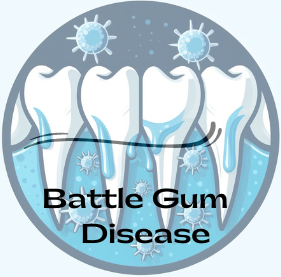
We all experience stress, and the majority of us try our hardest to avoid it. However, did you realize that stress may be infiltrating your oral cavity and compromising the health of your gums? Yes, stress affects more than just your emotions and sleep patterns; it also has a significant impact on your dental health, especially in regards to gum disease.
In the United States alone, gum disease, sometimes referred to as periodontal disease, affects almost half of persons over thirty. Although heredity, smoking, and poor oral hygiene are well-known causes, stress is an often-disregarded element that can seriously damage your gums. Let’s examine how stress affects your physical well-being, why your gums are especially susceptible, and how you may shield your smile from its negative consequences.
The Impact of Stress on the Human Body and Dental Health
Stress affects the entire body and triggers a series of physiologic reactions; it’s not only in your head. Your body releases the “fight-or-flight” hormone cortisol when you’re under stress. Cortisol is useful in short-term situations (such as evading a rogue shopping cart), but persistent stress keeps your levels of cortisol high, which is where the problems start.
How Cortisol Harms Your Gums:
- Inflammation: Your gums and other parts of your body become more inflamed when your cortisol levels rise. The tissues supporting your teeth are weakened by inflammation, which facilitates the growth of bacteria.
- Weakened Immune System: Stress impairs your body’s ability to combat infections, particularly gum disease-causing bacteria.
- Poor Wound Healing: When hormones associated with stress are present all the time, your body finds it more difficult to heal gum tissue.
The Relationship Between Gum Disease and Stress
What specific role does stress play in gum disease, then? It turns out that stress generates the ideal environment for dangerous oral germs to proliferate, and research supports this view.
What the Research Says:
- Research has indicated that those experiencing long-term stress exhibit elevated levels of gingivitis and plaque in comparison to those experiencing less stress.
- Because stress lowers salivary flow, your mouth is less naturally cleansed, which makes it less difficult for bacteria to adhere to your teeth and gums.
- Prolonged stress raises inflammatory cytokine levels, which exacerbate gum disease and result in bleeding, inflammation, and gum recession.
Gum disease can be accelerated by stress when you combine lowered immunity, elevated inflammatory processes, and poor oral hygiene practices that frequently accompany stress (such as failing to floss or neglecting dentist appointments).
“Stress is like an uninvited houseguest that not only overstays their welcome but also throws a party and leaves you to clean up the mess.“
Typical Oral Health Problems Associated with Stress
Stress causes a number of additional dental problems that indirectly lead to gum disease in addition to inflaming your gums.
Watch this brief video about stress related to oral issues below: This video is presented to you by McCawley Center for Laser Periodontics & Implants
Teeth Grinding (Bruxism)
- Teeth grinding is frequently caused by anxiety and stress, particularly at night.
- Excessive pressure from grinding causes gum recession and heightened sensitivity in your teeth and gums.
- Additionally, it might weaken your teeth’s structure over time, making them more susceptible to infections.
Dry Mouth
- Stress inhibits the production of saliva, which is necessary for removing food particles and microorganisms.
- Gum disease is more likely to develop when the mouth is dry because plaque can accumulate more readily.
Bad Dental Hygiene Practices
- Brushing and flossing might easily become less important when you’re under stress.
- Gum health is further deteriorated by emotional eating and a greater amount of acidic or sugary meals.
- If you put off routine dental exams because you’re too busy or stressed, you risk letting minor gum disease worsen into more significant issues.
“Let’s face it: when life gets chaotic, flossing just doesn’t seem as important as binge-watching your favorite show.“
Stress Management to Enhance Gum Health
The good news? You don’t have to endure gum stress permanently. Both your general health and the health of your gums can be greatly enhanced by managing your stress.
Adopt Stress-Reduction Strategies
- Exercise: Frequent exercise elevates mood and lowers cortisol levels.
- Mindfulness and Meditation: Both breathing techniques and meditation reduce stress and enhance general health.
- Adequate Sleep- Getting enough sleep helps the body cope with stress and maintain healthy gums.
Boost Your Oral Health Habits
- Use fluoride toothpaste and brush no less than twice a day.
- To get rid of plaque between teeth, floss every day.
- To lessen dangerous microorganisms, use a mouthwash that is antibacterial (such as Parodontax).
Maintain a Healthy Diet
- Consume meals high in vitamins C and D to boost immunity and gum health.
- Drink plenty of water to promote salivation.
- Steer clear of processed foods and too much sugar, which feed dangerous mouth germs.
Conclusion
Even though stress is inevitable, it doesn’t have to have a lifelong effect on your gum health. Prolonged stress weakens your immune system, promotes bad oral hygiene, and causes inflammation, all of which contribute to gum disease. However, you can maintain the health of your smile and protect your gums by controlling your stress, maintaining a good oral hygiene regimen, and being mindful of your food.
Therefore, avoid being stressed out due to your everyday activities. Breathe deeply, grab your floss (rather than that candy bar), and provide your gums the respect they merit. Both your dentist and your potential new self will appreciate it.
“Here’s a little transparency: Our website contains affiliate links. This means if you click and make a purchase, we may receive a small commission. Don’t worry, there’s no extra cost to you. It’s a simple way you can support our mission to bring you quality content.”
